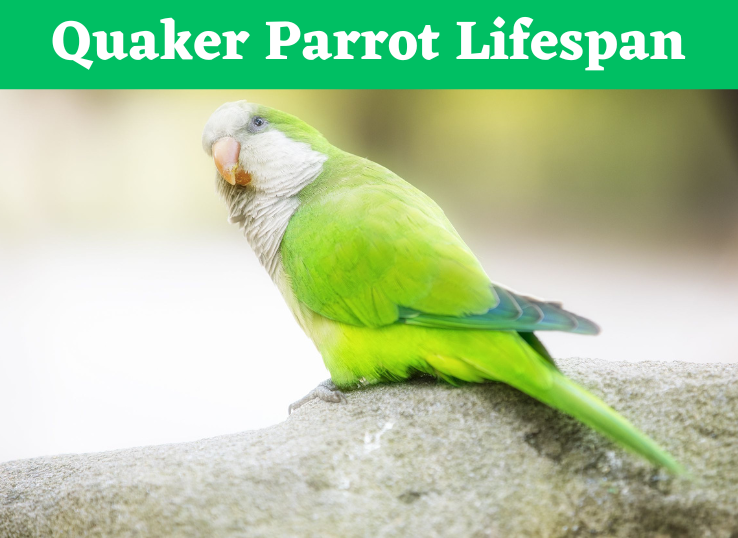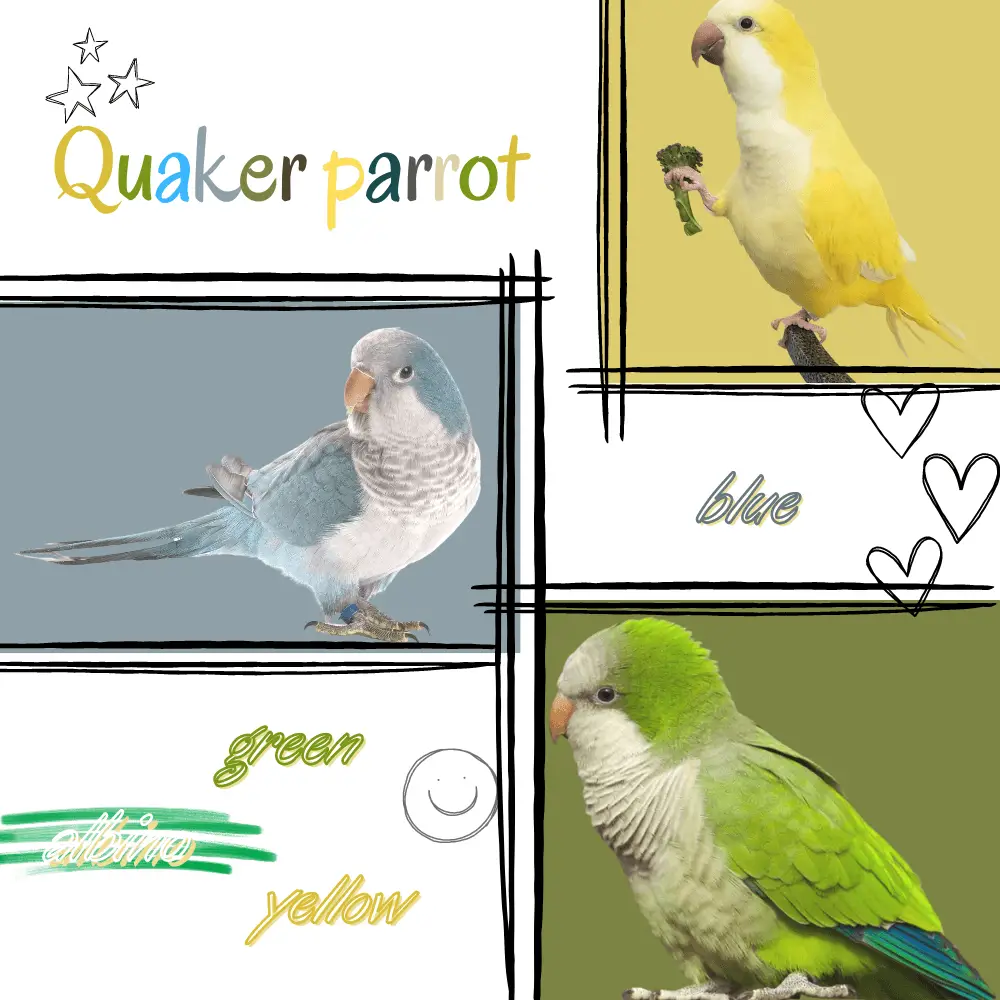Exploring The Lifespan Of Quaker Parrots: A Comprehensive Guide
Quaker parrots, also known as monk parakeets, are fascinating creatures that have captured the hearts of bird enthusiasts worldwide. These intelligent and social birds have a lifespan that can span several decades, making them a beloved lifelong companion for many. If you're considering bringing a quaker parrot into your life, it's essential to understand their longevity and the factors that influence their lifespan.
As one of the most popular pet bird species, quaker parrots offer a unique blend of charm, intelligence, and adaptability. Their ability to mimic speech, form strong bonds with their owners, and maintain an active lifestyle makes them an excellent choice for those looking for a long-term pet. However, owning a quaker parrot is a significant commitment, as these birds can live for a long time.
In this article, we will delve deep into the lifespan of quaker parrots, exploring the factors that contribute to their longevity, the average lifespan in captivity versus the wild, and how you can ensure your quaker parrot enjoys a healthy and fulfilling life. Let's embark on this journey to understand the remarkable lifespan of quaker parrots.
Table of Contents
- Introduction to Quaker Parrots
- Average Lifespan of Quaker Parrots
- Lifespan in the Wild vs. Captivity
- Factors Affecting Lifespan
- The Role of Diet in Lifespan
- Importance of Healthcare
- Creating a Suitable Environment
- Bonding and Social Interaction
- Common Health Issues and Prevention
- Conclusion and Final Thoughts
Introduction to Quaker Parrots
What Makes Quaker Parrots Unique?
Quaker parrots are medium-sized parrots native to South America, primarily found in Argentina, Brazil, and surrounding regions. These birds are known for their vibrant green plumage, gray face, and distinctive ability to build communal nests. Unlike most parrot species, quaker parrots construct large, elaborate nests using twigs and other materials, which they use for shelter and breeding.
In addition to their nesting behavior, quaker parrots are renowned for their intelligence and ability to mimic human speech. They can learn a wide range of words and phrases, making them a favorite among bird lovers. Their playful nature and social behavior also contribute to their popularity as pets.
Average Lifespan of Quaker Parrots
How Long Do Quaker Parrots Live?
The average lifespan of a quaker parrot is approximately 20 to 30 years, with some individuals living even longer under optimal conditions. In rare cases, quaker parrots have been known to live beyond 30 years, reaching up to 35 years or more. However, their lifespan largely depends on factors such as diet, healthcare, and living conditions.
It's important to note that while quaker parrots have a long lifespan, they require consistent care and attention to thrive. Owners must be prepared for the long-term commitment involved in caring for these birds, as they can outlive many other pets.
Lifespan in the Wild vs. Captivity
Understanding the Differences
In the wild, quaker parrots typically live for 15 to 20 years. Their lifespan is shorter due to various challenges such as predation, limited access to food, and exposure to harsh environmental conditions. Additionally, wild quaker parrots face threats from habitat destruction and human interference.
In captivity, quaker parrots can live significantly longer, often reaching 25 to 30 years or more. This extended lifespan is attributed to the controlled environment, access to nutritious food, regular veterinary care, and protection from predators. However, it's crucial for owners to provide a stimulating and enriching environment to ensure their quaker parrot remains healthy and happy.
Factors Affecting Lifespan
Key Influencers of Longevity
Several factors influence the lifespan of quaker parrots, both in the wild and in captivity. Below are some of the most significant factors:
- Diet: A balanced and nutritious diet is essential for maintaining good health and extending lifespan.
- Veterinary Care: Regular check-ups and prompt treatment of health issues can significantly improve longevity.
- Environment: A safe, clean, and stimulating living space is crucial for the well-being of quaker parrots.
- Social Interaction: Quaker parrots are social creatures that thrive on interaction with their owners and other birds.
- Exercise: Providing opportunities for physical activity helps maintain their physical and mental health.
The Role of Diet in Lifespan
Feeding Your Quaker Parrot for Longevity
A well-balanced diet is one of the most critical factors in ensuring a long and healthy life for your quaker parrot. Their diet should consist of high-quality pellets, fresh fruits and vegetables, and occasional seeds and nuts. Avoid feeding them foods that are toxic to birds, such as chocolate, caffeine, and avocado.
According to research published in the Journal of Avian Medicine and Surgery, a diet rich in vitamins and minerals can help prevent common health issues in quaker parrots, such as obesity and nutritional deficiencies. It's essential to consult with an avian veterinarian to create a customized diet plan for your bird.
Importance of Healthcare
Ensuring Long-Term Health
Regular veterinary care is vital for maintaining the health of quaker parrots. Annual check-ups allow veterinarians to monitor their overall health, detect potential issues early, and provide necessary vaccinations or treatments. Additionally, owners should be vigilant about signs of illness, such as changes in appetite, behavior, or physical appearance.
Some common health issues in quaker parrots include psittacosis, feather plucking, and respiratory infections. Early intervention and proper treatment can help manage these conditions and improve the bird's quality of life.
Creating a Suitable Environment
Designing a Safe and Stimulating Home
A suitable environment is essential for the well-being of quaker parrots. Their enclosure should be spacious enough to allow for movement and play, with perches of varying sizes and textures to promote foot health. Toys and enrichment activities should be provided to keep them mentally stimulated and prevent boredom.
Quaker parrots also benefit from supervised out-of-cage time, which allows them to stretch their wings, explore their surroundings, and interact with their owners. Ensure that the room is safe and free from hazards, such as open windows, toxic plants, and small objects that could be swallowed.
Bonding and Social Interaction
Building a Strong Relationship
Quaker parrots are highly social birds that thrive on interaction with their owners and other birds. Spending quality time with your quaker parrot helps build trust and strengthens your bond. Activities such as talking, playing, and training sessions can provide mental stimulation and reinforce positive behavior.
It's important to note that quaker parrots are sensitive to changes in their environment and routine. Consistency and patience are key to developing a strong and lasting relationship with your bird.
Common Health Issues and Prevention
Addressing Potential Concerns
While quaker parrots are generally hardy birds, they are susceptible to certain health issues. Some of the most common problems include:
- Feather Plucking: Often caused by stress, boredom, or nutritional deficiencies.
- Respiratory Infections: Can result from exposure to dust, smoke, or poor ventilation.
- Psittacosis: A bacterial infection that affects the respiratory system.
- Obesity: Caused by a diet high in fats and lack of exercise.
Preventing these issues involves providing a balanced diet, maintaining a clean and well-ventilated environment, and ensuring regular veterinary check-ups.
Conclusion and Final Thoughts
In conclusion, quaker parrots have a remarkable lifespan that can span several decades, making them a lifelong companion for many bird enthusiasts. Their intelligence, social nature, and ability to mimic speech make them a beloved pet, but owning a quaker parrot requires a long-term commitment. By providing a balanced diet, regular veterinary care, a stimulating environment, and plenty of social interaction, you can ensure your quaker parrot enjoys a long and healthy life.
We encourage you to share your experiences with quaker parrots in the comments below. Additionally, feel free to explore other articles on our site for more insights into bird care and related topics. Together, let's create a world where quaker parrots can thrive and live their best lives.


